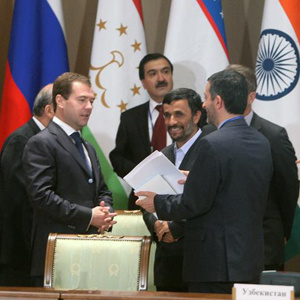Russia Has No Commitments to Iran
Bahram Amir-Ahmadian believes that instead of Russia, Iran should rely on its domestic forces

 Approaching G20’s deadline, diplomatic visits between Israeli, Russian and Western diplomats are showing a significant increase. West wants Russia to play a more crucial role in Middle East, especially when it comes to Iran. Iranian Diplomacy has interviewed Bahram Amir-Ahmadian, Russian affairs expert on the issue:
Approaching G20’s deadline, diplomatic visits between Israeli, Russian and Western diplomats are showing a significant increase. West wants Russia to play a more crucial role in Middle East, especially when it comes to Iran. Iranian Diplomacy has interviewed Bahram Amir-Ahmadian, Russian affairs expert on the issue:It seems that by successive diplomatic visits, the United States, European Union and Israel are trying to convince Russia play a more significant role in the Middle East affairs. What is the basis for Russia’s serious presence in this region?
Russia itself has recently decided to play a more powerful role in Middle East. Saudi Arabia-U.S. relations are shaky at the present and the Arab state has shown that it can tilt towards Russia if sensing the need.
Of course, since Putin’s presidency Russia was interested in having a key role in Middle East. Frequent visits between Russian and Israeli officials were some proof. I can say Moscow was intent to step in this path but the global economic crisis held it back from its plans. Nevertheless, with Russia’s increasing presence in Middle East increasing visits to Moscow by Israeli leaders are natural.
Meanwhile, in Russia’s foreign strategy a nuclear Iran can not be tolerated on southern borders. We know that Bushehr nuclear power plant is not a part of the dispute between Iran and West. For Russia, that is a part of the economic cooperation between two countries, but they are trying to push it inside the nuclear standoff discourse.
Are Israel, European Union and U.S. trying to make Russia aware of Iran’s danger and align Moscow with the international community’s stance?
I do not think so since Russians are intelligent in their foreign diplomacy. These countries are trying to encourage Russia stop supporting Iran. Of course Moscow has not totally backed Iran in the nuclear issue, as it has voted in favor of all UN Security Council resolutions against Iran.
I think that Moscow is currently trying to predict Iran’s next step to design a befitting policy. Meanwhile, Israel, European Union and the United States are not going to place Russia under excessive pressure to follow their Iran policy. The successive visits to Moscow by Israeli and Western diplomats are probably to find out about Russia’s likely response to Iran’s next step.
Western media have already primed the global public opinion on alleged danger rising from Iran’s [military] goals. With Iran’s recent developments things have become more complicated and West has somehow succeeded in gaining the support of public opinion. As part of its foreign policy, Iran should work for reconciliation between political groups inside.
How do you predict Moscow’s reaction to West’s demand?
Russia is seeking its own national interests and regulates its foreign diplomacy based on those interests. If Moscow comes to the conclusion that Israel and West satisfy its interests better, it may change its Iran policy within the Five plus One negotiations.
No country is committed to another to serve its national interests. Between Iran and Israel, Russia chooses the one which is weightier. However, Moscow’s foreign diplomacy has been always based on establishing equilibrium. Russia does not want to put all its eggs in one basket. It even follows this policy when it comes to Arab-Israeli relations. Russia has always abstained to show particular interest in a certain country and that makes it difficult to predict Russia’s long-term policies.
In its interaction with Russia, Iran should be more cautious and realize that Russia is not a country it can rely on for preserving national interests. Iran should face towards domestic forces.

